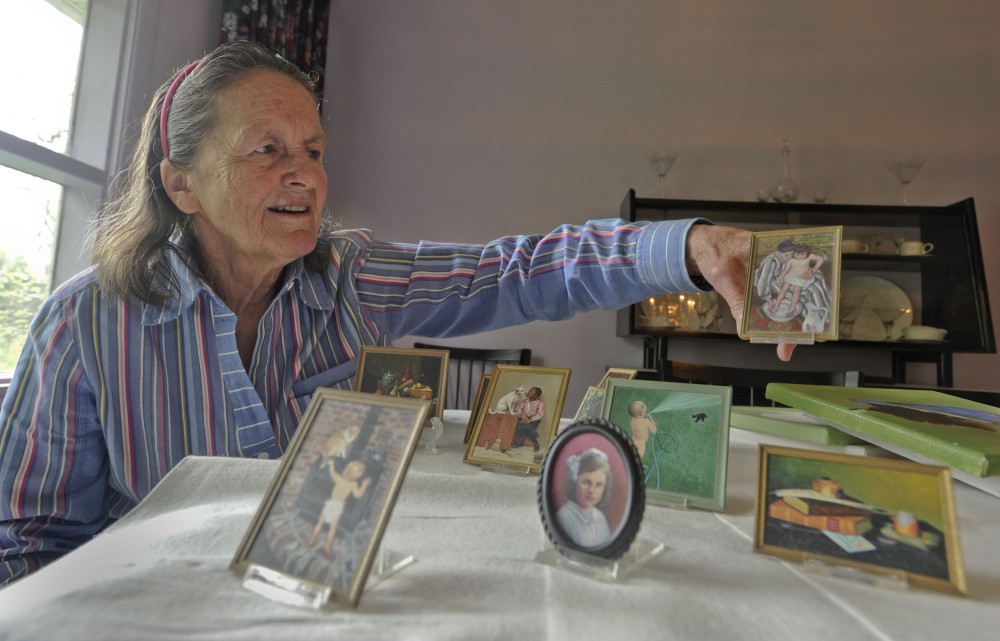By Kristin E. Holmes
The Philadelphia Inquirer.
PHILADELPHIA
Patricia Ray Guckes’ husband never wanted her to work. So she painted.
Up at 5 every morning, before her husband and two daughters, Guckes sat on a stool facing her easel in the kitchen of her Lower Moreland, Pa., home.
She imagined pretty pictures and painted them, many smaller than a playing card. Then the chaos of the morning took over.
For decades, Patty Ray Guckes’ routine yielded portraits, ocean scenes, and paintings of delicately rendered birds, but only recently did she exhibit in her first show, at age 82.
This month, Guckes was one of several artists featured in a small show at Abington Memorial Hospital. She has booked another for the fall, and a gallery owner in Lambertville, N.J., wants to see more of her work.
Family had taken precedence over her hobby, but one of her daughters died in 2010 and her husband died in December while she was with him on a cruise.
“My neighbor said, ‘What are you going to do with your life?'” Guckes said. She said she responded, “I always wanted to be a famous artist.”
In the ninth decade of her life, that is what Guckes is setting out to do. She has enough product. The paintings fill her home, against walls, under beds, and even in the shower stalls of a house outfitted with furnishings that look as if they came from the set of “Mad Men.”
That is just one of the ways that Guckes seems a woman from another time. She says her husband, James, did everything.
He made the money, paid the bills, and drove the car.
“I never even had an allowance,” Guckes said. “He said, you don’t need it. I’ll buy you anything you want.”
James Guckes, a mechanical engineer and businessman, kept his wife sheltered from the “stress and problems” of everyday life, said the couple’s daughter, Patricia Lee Wilson of Doylestown, Pa. But now, there is no longer a shelter.
“I showed her how to pay a bill, and she’s been paying them ever since,” Wilson said of the time since her father died. “She even called a plumber over to fix the sink.”
Guckes plans to buy a car and start driving again, after years of relying on her husband or her own feet. When he didn’t drive her, Guckes walked the 3.5 miles to Willow Grove Park or the grocery.
Now that she has art to sell, Guckes plans on buying a hatchback, stocking it full of her art, and driving it around to shop her work. She’s worried about making ends meet.
Guckes began sketching as a youngster. She took one art course while earning her bachelor’s degree in home economics at what is now McDaniel College in Westminster, Md.
Guckes met her husband at the Shore while she worked as a waitress at the Chatterbox, an Ocean City mainstay.
They married a year later, and Guckes began life as a homemaker. Her husband bought her a paint set to keep her from being bored. She often painted with her daughters.
“I would draw her, and she would draw me,” said Wilson, a former art teacher. Wilson’s younger sister, Stephanie Gehlert, is deceased.
During 14 of the family’s summers in Ocean City, Guckes taught at the Ocean City Arts Center. She began specializing in miniatures, painting replicas of masterworks that adorn dollhouses, including works by Mary Cassatt and Johannes Vermeer.
In the 1980s, several of her pieces were part of a dollhouse exhibited at the White House during the Christmas season, Guckes said.
Guckes also painted some of her work on commission.
But family took precedence. When her husband became ill with a serious heart condition, she tended to him.
“She had to be with my dad,” Wilson said. “I think, now she is free to pursue her art.”
Neighbor Katie Sullivan is helping her. She often sees Guckes in the midst of the three-mile walk to the store and offers her a ride.
“She’s an emotional wreck,” Sullivan said. “But her eyes need to be open. Her husband is not here.”
Sullivan helped facilitate Guckes’ participation in the Abington show. Guckes sold two paintings, one for $500.
“She has thousands of pieces of art that she never sold,” Sullivan said. “I encouraged her to use her art as a way of gaining financial independence.”
Five months after her husband’s death, Guckes has been forced into finding her independence in other ways as well.
“I’ve never been so lonely,” Guckes said. “But I’m learning to do things, even a few things that my husband wouldn’t do.”














































































































































































































































































































































































